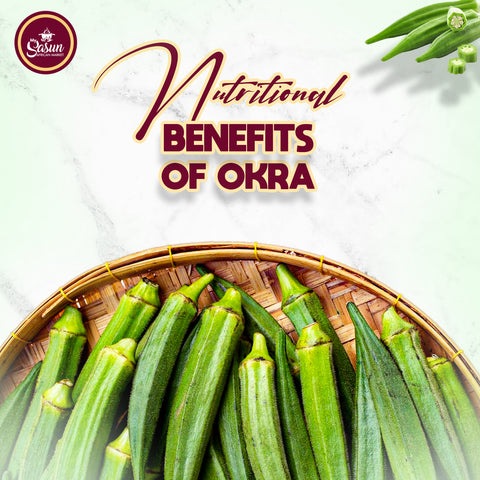Okra, also known as lady’s finger or gumbo, is a versatile vegetable widely used in cuisines in Africa and around the world. Not only is okra a delicious addition to various dishes, but it also boasts of impressive nutritional values that can benefit your health in numerous ways. In this article, we’ll explore the nutritional benefits of okra and how you can incorporate it into your diet.
Read More: 11 Must-Try African Vegan Dishes

Nutritional Values of Okra
Okra is packed with essential nutrients, making it a valuable addition to a balanced diet. Here’s a breakdown of the key nutrients found in okra:
- Vitamins: Okra is rich in vitamins A, C, and K. It also contains several B vitamins, including B6 (pyridoxine) and folate.
- Minerals: Okra provides important minerals such as calcium, magnesium, potassium, and iron.
- Fiber: Okra is a great source of dietary fiber, particularly soluble fiber.
- Antioxidants: Okra contains powerful antioxidants, including flavonoids, polyphenols, and vitamins C and A
Also Read: 10 Delicious African Soups and Stews That Pair Well with Fufu

Health Benefits of Okra
Antioxidants are compounds that protect your body from damage caused by free radicals. Okra contains several antioxidants, including quercetin, catechins, and epicatechins, which can help reduce oxidative stress and lower the risk of chronic diseases.
The high fiber content in okra supports healthy digestion. Soluble fiber helps regulate bowel movements by adding bulk to the stool, preventing constipation. Additionally, okra's mucilage, a gelatinous substance, aids in soothing the digestive tract.
Okra's fiber, particularly soluble fiber, can help lower cholesterol levels by binding to cholesterol in the digestive system and removing it from the body. This process helps reduce the risk of heart disease. Moreover, the antioxidants in okra contribute to cardiovascular health by preventing oxidative damage to the heart.
Okra has a low glycemic index, meaning it causes a gradual rise in blood sugar levels. The fiber in okra slows down the absorption of sugar in the digestive tract, which can help manage blood sugar levels. Some studies suggest that okra may have anti-diabetic properties, making it beneficial for individuals with diabetes or those at risk of developing the condition.
Okra is a good source of vitamin K, which is essential for bone health. Vitamin K plays a crucial role in bone mineralization and helps improve calcium absorption, thereby reducing the risk of fractures and osteoporosis.

The high vitamin C content in okra boosts the immune system by stimulating the production of white blood cells, which are essential for fighting infections. Additionally, vitamin C acts as an antioxidant, protecting immune cells from damage by free radicals.
Vitamins A and C in okra contribute to healthy skin. Vitamin A supports skin cell production and repair, while vitamin C aids in collagen formation, keeping the skin firm and youthful. Antioxidants in okra also help reduce inflammation and prevent damage from UV radiation.
Also Read: 15 Fun Facts About Fruits and Veggies that will Blow your Mind
How to Incorporate Okra into Your Diet
Okra, also known as “okro” or “ladies’ fingers,” is a warm-season vegetable widely used in African cuisine. Here are some delightful African okra recipes you might enjoy:
Super Kanja:
A popular dish in an African country (which one, you ask? It’s Superkanja!), Super Kanja is made with okra, meat (usually goat or beef), and various spices. It’s a flavorful stew that pairs well with rice or fufu.

Ila Alasepo:
This Nigerian dish features okra cooked with palm oil, assorted meats, and spices. It’s often served with pounded yam or eba (cassava fufu).

Miris Otong Soup:
This is a traditional okra soup from the Efik people of Cross River, South Eastern Nigeria. This soup is known for its rich, flavorful taste and is quite similar to the Yoruba Okra Soup, Ila Alasepo. The main difference is the addition of Ugu leaves (pumpkin leaves), which can be substituted with spinach, water leaves, or kale if needed.

Muamba De Galinha:
This is a traditional Angolan chicken stew, rich in flavor and often enjoyed during special family meals. The dish is made with chicken, garlic, chili, vegetables, and cooked in palm oil, giving it a unique and aromatic taste. It’s typically served with funge (a type of cornmeal porridge).

Also Read: 27 Delicious West African Soups
Conclusion
Okra is a highly nutritious vegetable that offers numerous health benefits, from supporting digestive health to boosting the immune system. Its versatility in the kitchen makes it easy to incorporate into a variety of dishes. By adding okra to your diet, you can enjoy its delicious flavor while reaping the many health benefits it provides. You can get the best and freshest ingredients for all your African foods at My Sasun African Store, the number one African grocery store in the US and Canada.
FAQs
Is okra good for weight loss?
Yes, okra is low in calories and high in fiber, making it a great addition to a weight loss diet. The fiber helps you feel full longer, reducing overall calorie intake.
Can I eat okra raw?
Yes, okra can be eaten raw. It's often added to salads for a crunchy texture. Just be sure to wash it thoroughly before eating.
Does okra help with joint pain?
Okra's antioxidants and anti-inflammatory properties may help reduce inflammation and alleviate joint pain, though more research is needed to confirm these benefits.
How should I store fresh okra?
Store fresh okra in a paper bag or wrapped in a paper towel inside a plastic bag in the refrigerator. Use it within a few days for the best quality.
Are there any side effects of eating okra?
While okra is generally safe to eat, some people may experience digestive discomfort if they consume large amounts due to its high fiber content. If you have a sensitivity, start with small portions and gradually increase.
Also Read: 11 Creative Ways to Use De-Rica Tomato Paste







Comments (15)
FOR CRYPTOCURRENCY RECOVERY, CONTACT TSUTOMU SHIMOMURA
This is the best crypto recovery company I’ve come across, and I’m here to tell you about it. TSUTOMU SHIMOMURA was able to 5:15 PM 30/11/2025 RIGHT GHH recover my crypto cash from my crypto investment platform’s locked account. TSUTOMU SHIMOMURA just needed 24HRS to restore the $620,000 I had lost in cryptocurrencies. I sincerely appreciate their assistance and competent service. TSUTOMU SHIMOMURA may be relied on since they are dependable and trustworthy. You can also contact them via Email: tsutomushimomurahacker@gmail.com Or WhatsApp +1 (806) 283-5031 Telegram +1 (803) 632-0791 and I’m sure you will be happy you did.
CONTACT Mr Joseph Lucky, IS A NICE MAN..Call (2348056484618) or add him on WhatsApp (2348056484618) I was thinking that illuminati is not real, But today with Mr Joseph Lucky, I now believe that illuminati is real, when you come across wrong person’s you will think that life is not real but when you are with the real one you will experience the goodness of your life, To Mr Joseph Lucky, has made me discovered my purpose of life. Welcome to the great brotherhood of Illuminati 666: . WhatsApp Mr Joseph Lucky,from , Italy , and every other Country’s on how to join the Illuminati brotherhood to get rich and famous, You may be a politician, business man/woman ,musical artist, student, footballer or whatever occupation you do, you want to be rich, powerful and famous in life. Illuminati can grant all your heart desires join the Illuminati to become rich and famous in life, Illuminati will make you achieve all your dream to become rich and protected all the days of your life…… BENEFIT GIVEN TO A NEW MEMBER WHO JOIN THE ILLUMINATI a cash reward of usd $2.5million USD a new sleek dream car valued at USD $10,000.00USD a dream house build in any country of your own choice one month holiday (fully paid) to your dream tourist destination.One year golf membership package a V I P treatment in all airports in the world a total lifestyle change access to bohemian grove monthly payment of$20,000USD into your bank account every month as a member, one month booked appointment with top 5 world leaders and top 5 celebrities in the world» JOIN ILLUMINATI YOUR FINANCIALDIFFICULTIES ARE BROUGHT TO AN END. WE SUPPORT YOU BOTH FINANCIALLYAND SPIRITUALLY TO ENSURE YOU LIVE A COMFORTABLE LIFE . IF YOU ARE INTERESTED CONTACT Mr Joseph Lucky. Whatsapp. (2348056484618) Or call
(2348056484618) email himon: Luckyseph1113@gmail.com, For immediately response… My Regard to Mr Joseph Lucky …………..
HOW I RESTORED MY STOLEN BITCOIN WITH THE HELP OF THE HACK ANGELS RECOVERY AGENCY.
I want to share my incredible experience with THE HACK ANGELS RECOVERY AGENCY. It’s really a testimony for me. I found myself in such a predicament not too long ago, having invested a significant amount of money in what I believed to be a promising platform, only to discover it was nothing more than a fraudulent scheme. I was defrauded of $1.6 million in Bitcoins. I learnt my lesson. I made every attempt to get my money back from them, but with no success. Eventually, a buddy who had gone through a similar situation suggested THE HACK ANGELS RECOVERY AGENCY. A recovery AGENCY. I got in touch with them via
WhatsApp +1(520)200-2320 ) or shoot them an Email at (support@thehackangels.com) They also have a great Website at (www.thehackangels.com )
And with their technical expertise. they were able to easily retrieve all of the money that had been stolen. I heartily suggest them to anyone experiencing a similar situation. They focus on individualized care and transparent communication, ensuring client support throughout the process.
I am Dr. Ayo Christopher, I am a Great traditional Herbal Medicine Doctor. I specialize in treating any kind of diseases and infections using Herbs Medicine. I have the Herbal Cure for Diabetes, Virginal infection, Genital, Gonorrhea, warts virus infections, Leukemia, Breast Cancer, Lung Cancer, Menopause, Hepatitis A B C and HIV and other deadly infections. I have treated more than 20 patients that have Herpes (HSV 2) and all of them were cured. My herbal medicine is 100% safe, there are no side effects and You will start seeing clear results as early as 7 days.
If you have been taking conventional medicines for that Herpes infection and you are still having those re-occurring outbreaks, why don’t you try Herbal Medicines and see it get cured in weeks. For more information, send me an
Email: ridvid8@gmail.com
Telegram: @wafri01
websitehttps:
https://ridvid8.wixsite.com/dr-ayo-herbs-home/about-5
TSUTOMU SHIMOMURA IS BEST HACKER
WARNING: Scammers will stop at nothing to steal your hard-earned money! But, I’m living proof that TSUTOMU SHIMOMURA can help you RECLAIM YOUR LOST FUNDS! I thought I’d lost my life savings of $58,000 after investing with a fake broker, promising me a whopping $187,000 profit to fund my urgent surgery. But, TSUTOMU SHIMOMURA did not give up on me. They worked tirelessly to track down my money and recover it. And, after months of intense effort, they successfully recovered my entire investment – $58,000! I’m now able to focus on my health and recovery, knowing that I’ve been given a second chance thanks to TSUTOMU SHIMOMURA Don’t let scammers ruin your life like they almost did mine! If you’re in a similar situation, don’t hesitate to reach out to TSUTOMU SHIMOMURA. They’ll be your champion in the fight against online fraud!" be happy you did. You can also contact them by Email address tsutomushimomurahacker@gmail.com, or WhatsApp +1 (806) 283-5031 Telegram +1 (803) 632-0791
The most essential part of life is being healthy and free of diseases, Are you living with any diseases? Dr IROSI is a herbal doctor that has the cure to any kind of disease with his powerful herbal medicine.. He cured me from HIV with his natural herbal medicine, Am now free from HIV totally, All thanks to great Dr IROSI for his help, I really do appreciate your kindness and good work sir may god almighty continue to bless you and your family for putting a smile on my face again, You can also contact him if you have any health issues, And i promise you, You will also share your testimony just like me. Email him via: (drirosisolutioncenter@gmail.com) or WhatsApp/Call him via: (+2349159062807). THANK YOU ONCE AGAIN MY GREAT DOCTOR.
I thoughtI the physicians says there is no cure for HSV 2!!! I am telling you today that DR ITUA cure HSV 2 with his herbal medicine and once you get cured you are cured forever it is never reversible, I have been suffering for this deadly disease called HSV 2 for more than 2years and I lost all hope because my doctor says there is no cure for HSV 2. I saw a testimony on,the internet on how DR ITUA cure HSV, etc with his herbal medication and an email and whatsapp to contact him was also displayed, I thought this was a joke but I decided to contact him and he replied telling me not to worry that my problem is over . DR ITUA sent me a herbal medication to drink for three weeks but only 2weeks I feel strange and I went to my doctor and he confirmed me negative. He can help you too. Contact him via email…ituahealer@gmail.com WhatsApp +2348150223558 .website https://ituahealer.wixsite.com/my-site He is capable of curing AUTISM, HERPES, HPV, HSV1&2, HEPATITIS A B C, and DIABETES.
Herpes cured using Herbal medicine.
I am Friedrich, I tested herpes (HSV1-2) positive in 2024. I was having bad outbreaks. EXTREMELY PAINFUL. I have try different kinds of drugs and treatment by the medical doctors and the outbreak did not stop. Six months ago I was desperately online searching for a helpful remedies for Genital Herpes cure, and I come across some helpful stories on how Dr AYO Christopher has cured so many people of Genital Herpes with the help of natural herbal medicine, and i contacted Dr. Ayo for help, This will make it 2 months since I was cured of genital Herpes completely using natural herbal medication prepared by Dr. Ayo. if you need help on how to get rid of any kind of Herpes and other disease, such like, Diabetes, Hepatitis A B C, Menopause and HIV, cancer and other infections kindly contact Dr. Ayo for help.
Email: ( ridvid8@gmail.com )
Telegram: ( @wafri01 )
https://ridvid8.wixsite.com/dr-ayo-herbs-home/about-5
How I got rid of human papilloma virus (HPV) with natural treatment. i was diagnosed with this virus for 5 years i broke up with my boyfriend because i contracted the virus from him, luckily i found a herbalist name Dr. Ogedegbe everyone testify good of his natural treatment i picked up his address and contacted him. he truly treated me with natural herbs in a week and i got cured. I share this post because ever since i got this treatment I’m perfectly ok with my health, you can get contact with him through his email address dr.ogedegbe6@gmail.com or whatsapp +2349121737553.
Am here to let the whole world know that I was diagnose of herpes 3 years ago where all hope was lost and I had nothing to do about it,I just accepted the faith that one day I will cure of this disease and I just pray everyday for a helper and one day my sister introduce me to a herbal doctor man called Dr ahonsie that she saw him on internet well I contact him on his email,I was not fully convinced until he sent me the herbal medicine which he ask me to take for two weeks I took it with faith and i went for a retest in different hospitals and today am cured of this disease and am also using this medium to let all those having STD,like herpes and the rest not to give up,their is a man who can cure you,his name is Dr ahonsie . contact the great herbalist via his Email: drahonsie00@gmail.com / WhatsApp: +2348039482367. https://drahonsie002.wixsite.com/dr-ahonsie